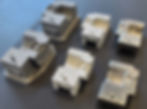Exploring Modern Advances in Manufacturing Technologies
- Rob Seymour
- May 12, 2025
- 4 min read
Updated: May 15, 2025
Manufacturing technologies are rapidly evolving, transforming the way industries operate. The advancements in these technologies have opened up new avenues for efficiency, precision, and innovation. In this blog post, we will explore the most significant modern advances in manufacturing technologies, highlighting how they impact the industry and what the future holds.
The Current Landscape of Manufacturing Technologies
The manufacturing sector has undergone significant changes over the past few decades. Automation, robotics, and artificial intelligence have become integral to manufacturing processes, allowing companies to streamline their operations. For instance, many businesses now utilize programmable robots on assembly lines, which reduces human error and increases productivity.

As automation becomes standard practice, a key area of focus is the Internet of Things (IoT). IoT devices enable manufacturers to collect real-time data from machines, improving efficiency and decision-making, performing predictive maintenance, and reducing downtime. According to a report by McKinsey, manufacturers that use IoT can increase productivity by 20% or more.
Advancements in Additive Manufacturing
One of the most significant advancements in manufacturing technologies is additive manufacturing, commonly known as 3D printing. This technology allows for the creation of complex structures that would be impossible or cost-prohibitive to produce using traditional methods. Industries, ranging from aerospace to healthcare, have adopted 3D printing for prototyping and production.

For instance, companies like General Electric use 3D printing to build lighter, more fuel-efficient jet engine components. This method not only saves materials but also accelerates the production timeline. According to a study, additive manufacturing can reduce the lead time by up to 90%.
A notable player in this space is SEYMOUR Advanced Technologies, which is leading the implementation of 3D additive manufacturing to reduce custom industrial automation machinery. By leveraging this technology, SEYMOUR Advanced Technologies is not only optimizing the design and production of complex automation equipment but also significantly cutting costs and time. As the technology matures, it promises to revolutionize supply chains by enabling localized production, making it easier for companies to adapt to market demands faster.
The Role of Artificial Intelligence in Quality Control
Artificial intelligence is playing an increasingly vital role in quality control within manufacturing processes. Through machine learning algorithms, AI systems can analyze vast amounts of data to identify defects in manufacturing output. This capability has enabled companies to achieve higher quality standards and reduce waste.

A common application of AI in manufacturing is predictive analytics. Companies can predict equipment failures before they happen, allowing for proactive maintenance. The results can be staggering; manufacturers that leverage AI in quality control report a reduction in waste by up to 30%. This not only saves costs but also supports sustainable practices by minimizing environmental impact.
Leading the charge in this transformation is SEYMOUR Advanced Technologies, which is pioneering the implementation of Statistical Process Control (SPC) into their machines to provide insights on Overall Equipment Efficiency (OEE). By integrating SPC, SEYMOUR enhances the ability to monitor and control manufacturing processes in real-time, ensuring that equipment is used to its fullest potential. This not only optimizes productivity but also contributes to a more efficient and sustainable manufacturing environment.
Sustainability Through Smart Manufacturing
As awareness of environmental issues grows, the manufacturing sector is shifting toward more sustainable practices. Smart manufacturing technologies are leading this movement. By integrating renewable energy sources and utilizing advanced data analytics, manufacturers can optimize resource consumption and reduce their carbon footprints.
The rise of smart factories illustrates this trend perfectly. These facilities use interconnected devices to monitor energy consumption and automate control systems, resulting in significant operational efficiencies. According to industry experts, companies that implement smart manufacturing solutions can achieve energy savings of up to 25%.
Additionally, the adoption of eco-friendly materials is becoming a crucial aspect of sustainable manufacturing. Many companies are exploring bioplastics and recycled materials to decrease their reliance on fossil fuels. This convergence of technology and sustainability fosters innovation in product design and supply chain management.
Future Trends in Manufacturing Technologies
Looking ahead, several trends are shaping the future of manufacturing technologies. One significant trend is the rise of digital twins—virtual replicas of physical systems. These twins allow manufacturers to simulate processes and make data-driven decisions in real-time. As data collection becomes more pervasive, digital twins will become essential for operational optimization.
Moreover, the integration of blockchain technology in manufacturing stands to revolutionize supply chain transparency. By enabling end-to-end traceability, companies can ensure product authenticity and improve accountability. This shift will be particularly important in sectors like pharmaceuticals and food where safety is paramount.
Finally, the continued advancement of precision manufacturing services will enable companies to offer customized solutions at scale. Businesses can leverage technologies such as CNC machining and advanced robotics to meet specific customer requirements efficiently.
Embracing the Changes
Manufacturers today must adapt to the changing landscape of technology. Embracing modern advances is not just about staying competitive; it's about thriving in an environment that demands innovation. Companies that invest in training their workforce to embrace these technologies will likely outperform their competitors. SEYMOUR Advanced Technologies provides Southeast manufacturers with a competition-diminishing toolbox that accelerates their progress away from rivals, enabling them to leverage state-of-the-art solutions tailored to their needs.
In summary, modern advances in manufacturing technologies are reshaping industries and enhancing productivity. From additive manufacturing to AI-driven quality control, the integration of these technologies holds enormous potential for better efficiency and sustainability. SEYMOUR's innovative tools empower manufacturers to streamline their processes and enhance their operational capabilities.
Adaptation is crucial, and businesses that seize these opportunities will drive the future of manufacturing. Through a commitment to innovation and a willingness to evolve, along with the support of SEYMOUR Advanced Technologies, manufacturers can navigate the complexities of today’s market while preparing for tomorrow’s challenges.
_edited.png)